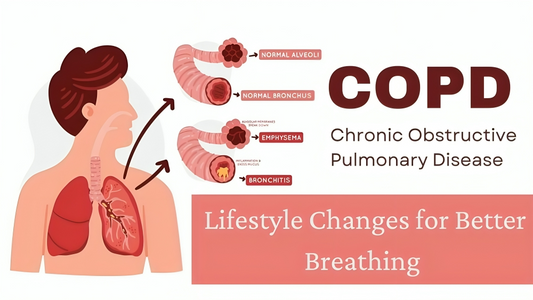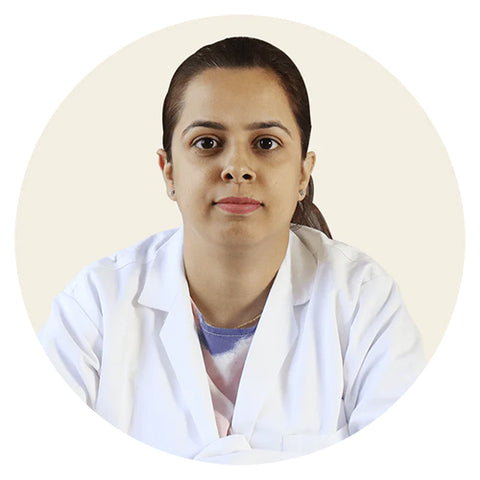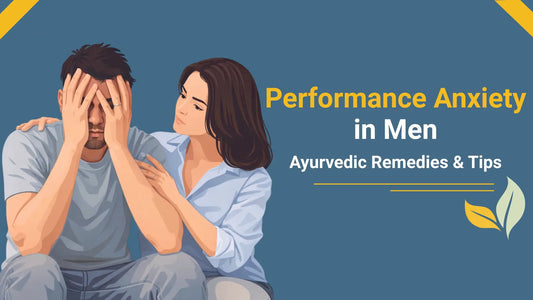
COPD (Chronic Obstructive Pulmonary Disease): Lifestyle Changes for Better Breathing
COPD refers to a considerable lung illness that makes breathing difficult. It can worsen over time if you don't manage it properly. In COPD, less air flows in and out of your body, making breathing hard. Genetics, smoke, air pollution, and aging can cause COPD.
Chronic obstructive pulmonary disease (COPD) patients may encounter shortness of breath, wheezing, coughing, and tightness in their chest, which interferes with their daily routine tasks.
However, you can handle your symptoms and improve your quality of life by modifying your lifestyle. We will break down certain lifestyle changes that can help you feel and live better.
Understanding COPD
COPD is a group of diseases that trigger breathing difficulty and blockages in airflow. These breathing problems slowly get worse after some time. There are mainly two types of COPD;
- Emphysema: In emphysema, air sacs (alveoli) damage the lungs, which help inhale oxygen and exhale carbon dioxide while breathing.
- Chronic Bronchitis: It is inflammation and narrowing of the bronchial tubes that move air inside and out of the lungs. The patient has suffered from a consistent cough that produces sputum for three months in two years.
Quit Smoking
Smoking is the most common cause of COPD; however, nonsmokers can suffer from this disease. Smoking provokes the condition of COPD and can cause other diseases such as hypertension, heart disease, stroke, or cancer.
Various medications and strategies are available that help smokers in quitting containing nicotine gum, patches, and oral medication. When you quit smoking, you improve your lung's health by oxygen intake and ease breathing.
Exercise
Don't be a potato couch and spend most of your time watching TV and using mobile screens—it will not help with your COPD. Move your body to ease your COPD symptoms.
Exercise training makes a difference in the COPD patient's life. High-intensity training, interval training, and breathing exercises help move enough oxygen to your blood.
Begin with breathing exercises to improve your oxygen flow and reduce stress along the way. Well, these are two vital breathing techniques that you must test to improve your breathing.
- Pursed-lip breathing. This breathing exercise slows down your breathing so you inhale and exhale more air into your body. Inhale through your nose for 2 seconds. Purse your lips and exhale air through your mouth for 5 seconds. Make sure to breathe out for a more extended period of time than breathe in, and don't push the air from your lungs. Meanwhile, this breathing technique can help you carry out your daily physical activities more easily than before.
- Abdominal (diaphragmatic) breathing: This technique strengthens your diaphragm, helps you breathe correctly, and boosts relaxation. To begin, relax your shoulder and place one hand on your stomach and the other on your chest. Slowly breathe in through your nose, ensuring the stomach extends and the chest remains still. Then slowly exhale through pursed lips and stomach inward. Repeat the process several times to get the most benefits.
Avoid Stress
Chronic stress can make your COPD condition even worse, and it can cause other diseases, such as heart disease, hypertension, and obesity. Stress and anxiety are prevalent in COPD patients.
You can reduce your stress by regularly performing yoga, mindfulness, or meditation. Besides that, antidepressants, cognitive behavior therapy, and other medication strategies can help you cope with stress and improve living.
Consume healthy food
You can manage your COPD symptoms by eating healthy food and avoiding junk and processed food. Studies have found a connection between obesity, diet, and COPD.
Unhealthy food like junk food causes weight gain, which makes it more difficult for COPD patients to breathe. Even being overweight can exhaust you, and your chances of getting infected increase. Therefore, maintain your healthy weight to manage COPD and avoid other complications.
- Take high-fiber food along with vegetables, fruits, and whole grains.
- Cut off excess sugar and salt—and keep your hydrated with liquids.
- Divide your meal into smaller portions to maintain your energy level.
Practice Good Hygiene
Prevent your lungs from more damage, and get vaccinated. Your lungs are at risk of getting infected from pneumonia and influenza. The main reasons for COPD exacerbation are lung infection and air pollution. Therefore, wash your hands properly and get a flu shot and the vaccine for pneumonia to avoid further damage.
Additionally, make sure to clean your oxygen equipment, keep yourself away from sick people, and avoid gathering over cold and flu season—wear a mask as a precautionary measure.
Improve the Indoor Air Quality
Indoor air is as polluted as outdoor air. So, it's important to improve indoor air quality to avoid chronic illness and purchase a HEPA filter to filter out polluted air in your home.
Avoid Irritants
COPD makes the lungs more prone to irritants than the average person's. Irritants include air pollution, car exhaust, chemical fumes, bug spray, paint and varnish, secondhand smoke, mold and mildew, wood smoke, and dust. Sometimes, perfumes and fragrances can irritate the lungs.
Even pleasant odors such as perfumes, fragrances, and air fresheners can bother your lungs. Wear a mask, or you can use a fan to keep the fumes beyond your reach.
Follow Your Treatment Plan
COPD treatments include lifestyle changes, inhaled and oral medications, and sometimes surgery. As there is no ultimate cure for COPD, however, you can control your symptoms to improve your life. Follow your treatment plan religiously to live better in your condition.
Adopt Ayurvedic Herbs
Include some Ayurvedic herbs in your daily routine to get relief from COPD. Ayurveda offers solutions for many diseases and illnesses. Herbs like Vasaka, Pushkarmool, Tulsi, Ashwagandha, and Stinging Nettle are known for their effectiveness in managing COPD.
The bronchodilator and anti-inflammatory properties of these herbs can also help with throat infections, mucus, asthma, and other respiratory issues.
Try Vayu Shuddhi for Allergic Bronchitis & Easy Breathe
Conclusion
Lifestyle changes can help you breathe better and manage your COPD. Quitting smoking, exercising, using breathing techniques, maintaining healthy eating habits, managing stress, following your treatment plan, and including ayurvedic herbs significantly help you live better with COPD.
You can get better at your symptoms by adopting a healthy lifestyle. Remember, consistency provides the best results, and small changes help you deal with COPD and breathe easier.

Dr. Hindika Bhagat
Dr. Hindika is a well-known Ayurvedacharya who has been serving people for more than 7 years. She is a General physician with a BAMS degree, who focuses on controlling addiction, managing stress and immunity issues, lung and liver problems. She works on promoting herbal medicine along with healthy diet and lifestyle modification.




